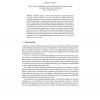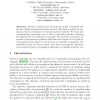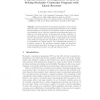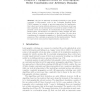112
click to vote
CSCLP
2005
Springer
15 years 4 months ago
2005
Springer
“Heuristic synergy” refers to improvements in search performance when the decisions made by two or more heuristics are combined. This paper considers combinations based on prod...
CSCLP
2005
Springer
15 years 7 months ago
2005
Springer
This paper presents an attempt to construct a ”practical” CSP algorithm that assigns a variable with 2 values at every step. Such a strategy has been successfully used for cons...
116
click to vote
CSCLP
2005
Springer
15 years 7 months ago
2005
Springer
Abstract. Among, Common and Disjoint are global constraints useful in modelling problems involving resources. We study a number of variations of these constraints over integer and ...
120
click to vote
CSCLP
2005
Springer
15 years 7 months ago
2005
Springer
Abstract. We adopt Benders’ decomposition algorithm to solve scenariobased Stochastic Constraint Programs (SCPs) with linear recourse. Rather than attempting to solve SCPs via a ...
107
click to vote
CSCLP
2005
Springer
15 years 7 months ago
2005
Springer
This paper introduces an architecture for generic constraint implementations based on variable views and range iterators. Views allow, for example, to scale, translate, and negate...
113
click to vote
CSCLP
2005
Springer
15 years 7 months ago
2005
Springer
CSP search algorithms are exponential in the worst-case. A trivial upper bound on the time complexity of CSP search algorithms is O∗ (dn ), where n and d are the number of variab...
124
click to vote
CSCLP
2005
Springer
15 years 7 months ago
2005
Springer
We give an efficiently executable specification of the global constraint of lexicographic order in the Constraint Handling Rules (CHR) language. In contrast to previous approaches...
136
click to vote
CSCLP
2005
Springer
15 years 7 months ago
2005
Springer
Problems that can be sampled randomly are a good source of test suites for comparing quality of constraint satisfaction techniques. Quasigroup problems are representatives of struc...
CSCLP
2005
Springer
15 years 7 months ago
2005
Springer
We discuss four variants of the graph colouring problem, and present algorithms for solving them. The problems are k-Colourability, Max Ind k-COL, Max Val k-COL, and, finally, Max...




